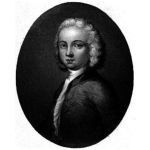The gallant Youth, who may have gained,
Or seeks, a "winsome Marrow,"
Was but an Infant in the lap
When first I looked on Yarrow;
Once more, by Newark's Castle-gate
Long left without a warder,
I stood, looked, listened, and with Thee,
Great Minstrel of the Border!
Grave thoughts ruled wide on that sweet day,
Their dignity installing
In gentle bosoms, while sere leaves
Were on the bough, or falling;
But breezes played, and sunshine gleamed-
The forest to embolden;
Reddened the fiery hues, and shot
Transparence through the golden.
For busy thoughts the Stream flowed on
In foamy agitation;
And slept in many a crystal pool
For quiet contemplation:
No public and no private care
The freeborn mind enthralling,
We made a day of happy hours,
Our happy days recalling.
Brisk Youth appeared, the Morn of youth,
With freaks of graceful folly,-
Life's temperate Noon, her sober Eve,
Her night not melancholy;
Past, present, future, all appeared
In harmony united,
Like guests that meet, and some from far,
By cordial love invited.
And if, as Yarrow, through the woods
And down the meadow ranging,
Did meet us with unaltered face,
Though we were changed and changing;
If, then, some natural shadows spread
Our inward prospect over,
The soul's deep valley was not slow
Its brightness to recover.
Eternal blessings on the Muse,
And her divine employment!
The blameless Muse, who trains her Sons
For hope and calm enjoyment;
Albeit sickness, lingering yet,
Has o'er their pillow brooded;
And Care waylays their steps-a Sprite
Not easily eluded.
For thee, O Scott! compelled to change
Green Eildon-hill and Cheviot
For warm Vesuvio's vine-clad slopes;
And leave thy Tweed and Tiviot
For mild Sorrento's breezy waves;
May classic Fancy, linking
With native Fancy her fresh aid,
Preserve thy heart from sinking!
Oh! while they minister to thee,
Each vying with the other,
May Health return to mellow Age
With Strength, her venturous brother;
And Tiber, and each brook and rill
Renowned in song and story,
With unimagined beauty shine,
Nor lose one ray of glory!
For Thou, upon a hundred streams,
By tales of love and sorrow,
Of faithful love, undaunted truth
Hast shed the power of Yarrow;
And streams unknown, hills yet unseen,
Wherever they invite Thee,
At parent Nature's grateful call,
With gladness must requite Thee.
A gracious welcome shall be thine,
Such looks of love and honour
As thy own Yarrow gave to me
When first I gazed upon her;
Beheld what I had feared to see,
Unwilling to surrender
Dreams treasured up from early days,
The holy and the tender.
And what, for this frail world, were all
That mortals do or suffer,
Did no responsive harp, no pen,
Memorial tribute offer?
Yea, what were mighty Nature's self?
Her features, could they win us,
Unhelped by the poetic voice
That hourly speaks within us?
Nor deem that localized romance
Plays false with our affections;
Unsanctifies our tears-made sport
For fanciful dejections:
Ah, no! the visions of the past
Sustain the heart in feeling
Life as she is-our changeful life,
With friends and kindred dealing.
Bear witness, Ye, whose thoughts that day
In Yarrow's groves were centred;
Who through the silent portal arch
Of mouldering Newark entered;
And clomb the winding stair that once
Too timidly was mounted
By the "last Minstrel,"(not the last!)
Ere he his Tale recounted.
Flow on for ever, Yarrow Stream!
Fulfil thy pensive duty,
Well pleased that future Bards should chant
For simple hearts thy beauty;
To dream-light dear while yet unseen,
Dear to the common sunshine,
And dearer still, as now I feel,
To memory's shadowy moonshine!







Comment form: